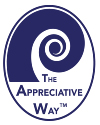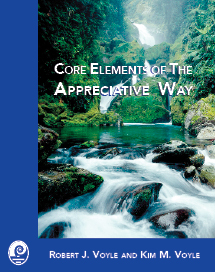

The Clergy CoachThe Rev. Dr. Rob Voyle is a leader in the development and use of appreciative coaching in his work with clergy. The Appreciative Way
Welcome to Yes!3Yes!3 is designed to help you
Yes! To God Stay ConnectedReceive The Appreciative Way our Free Email Newsletter Privacy: We never rent, sell, or share your email. |
Appreciative Leadership for Transformation
Training Schedule: Appreciative Leadership for TransformationNo Appreciative Leadership for Transformation workshops are scheduled at this time. Please see training schedule for a complete listing of all training programs. Appreciative Leadership for TransformationIn addition to being a "stand alone" program this 5 day program is also part of: Course DescriptionLeadership Development The ability to lead groups of people through change is rapidly becoming a core requirement of successful ministry. Research on leadership development has shown that leadership is:
From Chaplains to Leaders, or Shaman to Chiefs For the past 50 years the church's primary applied theology training has been Chaplaincy training. While that is great training for chaplains it does not prepare clergy to be leaders of congregations. This is the program to move you from Appreciative Leadership Training is at the heart of what the Clergy Leadership Institutes does. Training Outcome Following training participants will be able to positively and uniquely answer the three leadership questions:
Executive coaches taking this course will learn how to coach a client to be able to answer these questions. Learning ObjectivesBecause this is a multi-day program specific learning objectives are provided for each day. Specific Leaning Objectives Day 1: Participants will be able to:
Specific Leaning Objectives Day 2: Participants will be able to:
Specific Leaning Objectives Day 3: Participants will be able to:
Specific Leaning Objectives Day 4: Participants will be able to:
Specific Leaning Objectives Day 5: (half-day) Participants will be able to:
Who Should Attend This ProgramAlthough this program is designed with clergy leaders in mind, it would also be appropriate for leaders and coaches who can articulate and reflect psychologically and theologically on their leadership or coaching roles. Lay leaders, executives of not-for-profit organizations, and coaches who coach such leaders have attended and benefited from this program. It is especially relevant for:
This program will have a mix of people including:
Continuing Education CreditThis program qualifies for 30 hours of continuing education credit. Partial continuing education credit is not provided. You must attend all 30 hours to receive continuing education credit. American Psychological Association The Appreciative Way is approved by the American Psychological Association to sponsor continuing education for psychologists. The Appreciative Way maintains responsibility for this program and its content. This program qualifies for 30 hours of continuing education credit. Board Certified Coach (BCC) The Appreciative Way's Certificate of Appreciative Coaching is a BCC founding CCE-approved coach training program. This program provides 30 contact hours of training toward The Certificate of Appreciative Coaching. Pre-Training Leadership AssessmentUpon registration for the training participants will receive instructions and access codes to complete several online assessment inventories that are commonly used in the executive coaching and leadership development field. The results will be incorporated into the intensive training session. One of the instruments the "Leadership Practices Inventory" is a 360 degree instrument and will require several members of the clergy person's congregation or the coaches work environment to also complete the inventory. Because this will take time to accomplish early registration and planning is essential. Workshop FormatThe workshop will typically be conducted in a retreat setting with:
Typical Workshop Schedule:The following is a typical workshop schedule. The exact schedule may vary depending on location. For each specific program a flyer with dates, schedule times, and continuing education hours can be found on the training schedule page. Day 1-4 Day 5: Check the program flyers on the training schedule page for specific program details. No evening events are scheduled. Residential participants may gather after supper for socializing and informal conversations about the material that is being presented. Some variations in the daily schedule may occur depending on the training location. The above schedule includes lunch for commuters. When residential accommodation is provided, residential participants will also be provided with Breakfast and Supper during the course of the week. Attention is paid to managing personal energy during the training program while maximizing participants opportunities to learn. Because this training is intense we recommend people make appropriate travel plans and can begin the first days training rested so as to get the best possible return for your tuition expenses. Program Materials and Pre-ReadingBeyond completing the pre-training assessments, no pre-reading or backgound in Appreciative Inquiry is required for this program. You will be provided an extensive (approximately 300 page) workbook. Participants will be able to access additional online resources after the completion of the program. For those interested in pre-reading we recommend the following:
Costs for 2026
Specific times and costs of all programs may vary depending on the hosting organization. Please check the schedule and registration page for additional workshop specific information. AccommodationAccommodation and facility use fees are extra and are dependent on the training locations and will be specified on the registration forms. Meals between sessions are typically provided for commuters. Cancellation and Refund PolicyTuition Refunds The tuition portion of your registration is completely refundable, minus a 5% service fee, up to the day of starting the program. Tuition fees can be transferred to an alternative program without penalty. Accommodation Refunds Any commuter or accommodation fees will be assessed within one month of a program if the reservation is cancelled. Commuter or residential accommodation fees can not be transferred to other programs. For more information please see our Cancellation Policies. PresenterRob Voyle is an ordained Episcopal priest, psychologist, and executive coach. He is the Director of the Clergy Leadership Institute. Rob was an original faculty member, and taught for five years at the College of Executive Coaching where he taught and coached hundreds of personal and executive coaches how to use appreciative inquiry as a basis for their coaching work. |
|---|


